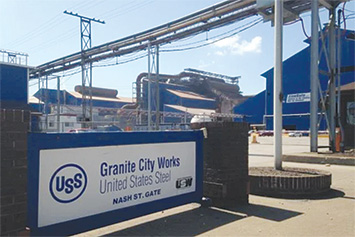By ELIZABETH DONALD
Illinois Correspondent
 Washington – Federal legislators are calling for answers in the sale of U.S. Steel to a Japanese steel company, an announcement that took many by surprise.
Washington – Federal legislators are calling for answers in the sale of U.S. Steel to a Japanese steel company, an announcement that took many by surprise.
U.S. Rep. Nikki Budzinski (D-Ill.) wrote an open letter to Nippon Steel, which was co-signed by U.S. Sens. Dick Durbin and Tammy Duckworth, all of Illinois. Budzinski called for transparency on worker retention, proposed layoffs and specifically their plans for the Granite City plant, which was placed on indefinite idle by U.S. Steel only weeks ago.
The letter expresses “deep concerns” with Nippon Steel’s plan to acquire U.S. Steel and in particular with its intent regarding collective bargaining agreements. The letter was addressed to Nippon President Eiji Hashimoto, based in Tokyo.
“Given the critical importance of the steel industry to our region and the long history of union labor driving U.S. Steel to global prominence, it is essential that any company that plans to do business with U.S. Steel have a full understanding of the company’s legal commitments to its workers under collectively bargained agreements, maintain those commitments, and ensure that workers are protected in the next phase of the company’s future,” Budzinski wrote.
U.S. STEEL INVESTIGATION
U.S. Steel was already under investigation from the Illinois Department of Labor regarding its handling of the plant idle, with allegations that it sidestepped the Worker Adjustment and Retraining Notification Act by classifying the October layoffs as temporary. A settlement has been reached in back pay for those workers, but the investigation continues, according to Budzinski’s letter.
Budzinski wrote that she and the senators are “troubled” by reports that Nippon Steel executives are supportive of U.S. Steel’s existing plans for production in the future. Those plans included shifting more steel working to Big River Steel 2 in Arkansas – a so-called “right-to-work” state – and that Nippon allegedly would follow that plan.
“A shift in jobs and operations from Granite City Works to Big River Steel would undermine the union labor force at the Granite City Facility, and have devastating impacts on the surrounding community,” she wrote.
QUESTIONS
Budzinski, Durbin and Duckworth included a list of questions they want Nippon Steel to answer:
- How does Nippon Steel plan to move forward with U.S. Steel’s existing operations and facilities in Illinois? How many workers will be retained or laid off?
- What commitments can Nippon Steel make about its future operations in Illinois, in particular in Granite City?
- What outreach did Nippon Steel conduct to stakeholders across sectors, including the United Steelworkers and state and community leaders, prior to going public with the planned acquisition?
That last question is of particular concern, as United Steelworkers International President David McCall has publicly stated neither Nippon nor U.S. Steel reached out to USW regarding the deal – which would be a violation of the partnership agreement that requires U.S. Steel to notify the union of any changes in control or business conditions.
Nippon has offered $55 a share in a $14.1 billion offer, which is a 40 percent profit on the U.S. Steel closing stock price before the announcement. Investors are giving about a 70 percent chance of the deal coming through but taking longer due to the intense scrutiny of lawmakers and unions, according to Reuters. Nippon’s posted acquisition statement indicates “all of U.S. Steel’s commitments with its employees will continue to be honored,” but further commitments have not been made public.
BIPARTISAN SCRUITINY
That scrutiny goes beyond the Democratic leaders who represent the immediate area of Granite City Works. Three GOP senators have also written to U.S. Treasury Secretary Janet Yellen asking that the Committee on Foreign Investment in the United States block the sale due to “deep concerns.”
“Despite the absence of any security-focused deliberation on U.S. Steel’s part, domestic steel production is vital to U.S. national security,” their letter read, co-signed by U.S. Sens. J.D. Vance (R-Ohio), Josh Hawley (R-Mo.) and Marco Rubio (R-Fla.). Other Democratic senators expressing concerns include U.S. Sens. Sherrod Brown (D-Ohio), John Fetterman (D-Penn.), Bob Casey (D-Penn.) and Joe Manchin (D-W.V.), as well as U.S. Reps. Chris Deluzio (D-Penn.) and Summer Lee (D-Penn.).
WHITE HOUSE INVOLVEMENT
That concern is shared by President Joe Biden, who has said the acquisition deserves close scrutiny even from an ally country, according to Forbes. National Economic Council Director Lael Brainard said the president sees U.S. Steel as a core component of domestic steel production critical to national security.
The White House acknowledged the concerns of the union leaders especially given USW’s support of the president’s efforts to shore up domestic steel manufacturing and protect it “against China’s unfair and market-distorting trade practices.”
In response, USW thanked the White House and Brainard for their support and reiterated that Biden has had an “unwavering commitment” to domestic workers and industries.
“Our union shares many of the concerns expressed in today’s White House statement, including how this deal may impact the future of domestic steel production,” McCall said. “U.S. Steel has made it clear, time and again, that its first and only priority is short-term financial gain for shareholders, even if this comes at the expense of workers, their communities and the nation’s lasting capacity to continue meeting its manufacturing needs.”
Meanwhile, more than 1,000 Granite City workers are under WARN notice of potential layoff after the plant is idled. Budzinski has called for the Labor Department investigation of the layoff and introduced legislation to strengthen the WARN Act notification requirements.


